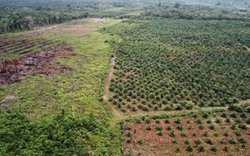Norway’s wealth fund ditches 33 palm oil firms over deforestation
KUALA LUMPUR: Norway’s US$1 trillion (RM4 trillion) sovereign wealth fund, the world’s largest, has pulled out of more than 33 palm oil companies over deforestation risks over the last seven years, a green group said today.
Norway’s Government Pension Fund Global (GPFG), which released its annual report yesterday, sold stakes in more than 60 companies due to deforestation — including 33 firms involved in palm oil — Rainforest Foundation Norway said.
“It’s great to see that the GPFG is taking action against deforestation,” Vemund Olsen, a senior policy adviser at the Oslo-based group said today.
“The divestments should be seen as a warning shot to those investors and companies still involved in deforestation,” Olsen, whose group has monitored the GPFG’s investments since 2010, told Reuters.
As the world’s most widely used edible oil, palm oil is found in everything from margarine to biscuits and soap to soups, as well as in biofuel.
But in recent years, the industry has come under close scrutiny from green activists and consumers, who have blamed it for clearing forests for plantations and causing fires, along with the exploitation of workers.
Green groups have often accused Norway of double standards by investing billions of dollars in palm oil or soya farmers while also giving cash to nations from Brazil to Indonesia to slow deforestation.
Norway signed a US$1 billion deal with Indonesia to help protect its tropical forests in 2010 and the first payment for reduced emissions was agreed last week.
Since 2012, the GPFG has become a more active shareholder and now pushes sustainability and ethics among its investments and drops firms that fail to meet its standards.
Marthe Skaar, spokeswoman at Norges Bank Investment Management, which manages the fund, confirmed that more than 60 divestments had been made due to deforestation risks, including 33 palm oil firms, since 2012.
Divestments in two palm oil companies happened as recently as last year, said Skaar, adding that the fund does not disclose the names of such companies.
Most palm oil is grown in Indonesia and Malaysia.
In a report released earlier this month, GPFG said that it engages with companies it owns stakes in to push them to cut their ties to deforestation.
It is currently asking banks in Indonesia, Malaysia and Brazil to adopt no deforestation criteria for their loans to the agricultural sector, the report said.
“The GPFG has realised that deforestation reduces its long-term returns on investments,” says Olsen.
“It’s increasingly clear that companies involved in deforestation, directly or through their supply chains, are a major liability to investors.”













